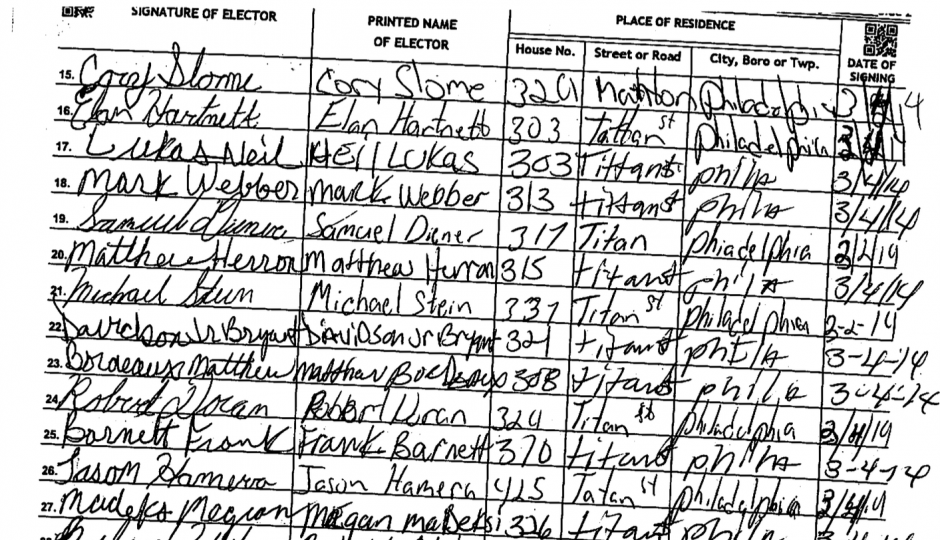The Brief: Happy Ballot Challenge Season!

We’ve officially entered that most wonderful time of year: Ballot Challenge Season.
To get on the May 19th primary ballot, a candidate running for citywide office in Philadelphia must get at least 1,000 voters to sign their nomination petitions. That paperwork must be filed by today, March 10th.
But the signatures can’t come from just anyone: They must be from registered voters of the candidate’s party. Each voter must write out their full name, address and the date on the petition, in addition to their signature. If any of these items are missing or somehow flawed, a candidate is leaving themselves open to a legal challenge from another campaign. Because why beat the competition in an open election when you can eliminate them beforehand?
You might be saying to yourself: Name, address, date and signature? That’s easy. But consider the reasons that courts in Pennsylvania have ruled signatures invalid in the past: “Because the signer failed to record the date of signing, instead placing ditto marks in the date column,” or, “the signer gave his mailing address instead of his voting address.” Or because the staffer circulating the petition “did not ‘become a registered member of the Democratic party until after the filing deadline.'”
Here’s how election attorney Adam Bonin, writing for Citified, described the process:
For the week following the petition deadline, lawyers like me (and the people we train) will be scouring the submitted pages of our rivals, looking for errors substantive and trivial, trying to see if enough signatures can be struck to eliminate a rival from a race. Potential expert witnesses will be consulted, from handwriting authorities to private investigators to, in one case, a cartographer I hired to demonstrate the physical impossibility of a single petition circulator who allegedly gathered 426 signatures walking through the streets of West Oak Lane on a single frigid Tuesday.
There are a couple ways to think about petition challenges: Some argue that they punish candidates with little money (and therefore fewer lawyers). Others say that candidates worth taking seriously should be able to comply with the law.
We’d suggest looking for shenanigans and silliness everywhere. If a campaign questions a candidate with 3,000 signatures, that might be an indication it’s mounting a frivolous challenge. At the same time, if a campaign fails to follow the basic rules — such as avoiding ditto marks on a petition — it’s a sign it’s not exactly competent.
And remember, as Bonin points out, it doesn’t have to be this way: “Pennsylvania could cede signature review to election administrators, and not leave it to adversarial litigation, to remove gamesmanship from the process and the possibility of its being used in shakier cases as a weapon to intimidate resource-poor candidates.”
Don’t Miss …
- Another huge blow for Attorney General Kathleen Kane: The Inquirer reports that District Attorney Seth Williams is set to announce Tuesday that a grand jury has recommended charges against current and former Democratic state Reps. Louise Williams Bishop, Michelle Brownlee and Harold James. Williams reopened the corruption case involving several Philadelphia lawmakers after Kane said it was flawed and could not be prosecuted.
- Bill Green is not legally challenging Gov. Tom Wolf‘s decision to oust him as chairman of the Philadelphia School Reform Commission. “Harmony needs to prevail,” Green says.
- The long-awaited rollout of SEPTA’s fare card system, which will ditch tokens and tickets, could save as many as 340 trees a year, as well as reduce litter around the city, according to a PlanPhilly report.
- State Sen. Anthony Williams is currently winning the endorsement game among mayoral candidates, with former City Councilman Jim Kenney trailing not far behind him.